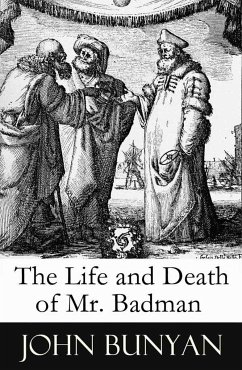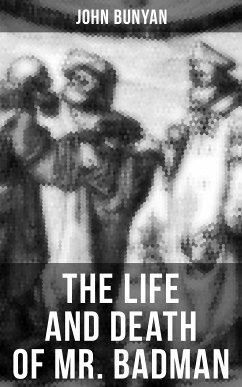
The Life and Death of Mr. Badman (eBook, ePUB)
A Sequal to The Pilgrim's Progress
Versandkostenfrei!
Sofort per Download lieferbar
0,49 €
inkl. MwSt.
Weitere Ausgaben:

PAYBACK Punkte
0 °P sammeln!
In "The Life and Death of Mr. Badman," John Bunyan employs an allegorical narrative to scrutinize the moral failings of an unrepentant man named Mr. Badman. This work, indicative of Bunyan's Puritan roots, weaves a cautionary tale that reflects the spiritual and moral struggles of 17th-century England. With a dramatic yet didactic literary style, Bunyan utilizes dialogue and rich character development to engage readers in a compelling examination of sin, vice, and the consequences of a life steeped in wickedness. The book serves as both a narrative and a moral reflection, echoing the theologic...
In "The Life and Death of Mr. Badman," John Bunyan employs an allegorical narrative to scrutinize the moral failings of an unrepentant man named Mr. Badman. This work, indicative of Bunyan's Puritan roots, weaves a cautionary tale that reflects the spiritual and moral struggles of 17th-century England. With a dramatic yet didactic literary style, Bunyan utilizes dialogue and rich character development to engage readers in a compelling examination of sin, vice, and the consequences of a life steeped in wickedness. The book serves as both a narrative and a moral reflection, echoing the theological concerns of the time and offering profound insights into the nature of salvation and condemnation. John Bunyan, a tinker by trade and a fervent Christian, wrote this book during his imprisonment for preaching without a license. His personal experiences with religious conviction and societal conflict deeply influenced his work. Bunyan's own journey toward faith, coupled with his engagement with Puritan ideology, shaped the poignant reflections found in this text. His earlier work, "The Pilgrim's Progress," set the stage for this continued exploration of sin and redemption. Readers seeking a profound exploration of moral integrity and the consequences of vice will find "The Life and Death of Mr. Badman" an indispensable read. Bunyan not only entertains but also implores readers to reflect on their spiritual state, making it a timeless piece that resonates beyond its historical context. This engaging tale remains a critical inquiry into the human condition and the eternal battle between good and evil.
Dieser Download kann aus rechtlichen Gründen nur mit Rechnungsadresse in A, B, BG, CY, CZ, D, DK, EW, E, FIN, F, GR, H, IRL, I, LT, L, LR, M, NL, PL, P, R, S, SLO, SK ausgeliefert werden.













